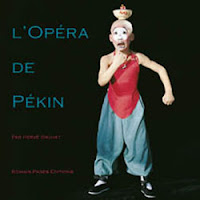The Beijing Opera School opened in 1957 after the proclamation of the Popular Republic of China; before that there were no schools like that, only houses of teaching lead by great masters (almost always former stage stars) who took care of some children’s acting career for many years, sometimes for the actor’s whole life. Since 1957 the education of Beijing Opera performers has been managed by the Chinese government. Students must start at a very early age to take advantage of their malleable bodies and voices, spending many years in the acquisition of several skills.
In 2003, after the publication of the book, “L’École de l’Opera de Pékin” with photographs of Hervé Bruhat, the school started to become well known around the world, especially in Europe. The photographer stayed one season in 2002 living inside the school with those children-students, taking photographs even while they studied, worked or in their daily life. This book is a precious document about the “renaissance” of this kind of Chinese theatre after its practical death during the Cultural Revolution in the 70s.
The school now has different groups giving performances through China and around the world, showing its training and extracts of the most famous Operas.
This year the school celebrates its 55th anniversary with a series of performances in many Chinese cities including, of course, Beijing. For three days at the Chang’An Theatre (the most important venue in China when it comes to Chinese Opera) the company of teenagers and children performed several extracts and “solos”. I went to the theatre on July 16th, 2007; the performance had 8 parts including some song solos without costumes, lasting approximately 2.5 hours.
I recorded lots of material, but I’d rather to share only 4 shorts videos: three parts of one Monkey King story and one of something very strange nowadays in China: a story played by men as feminine characters.
Monkey King Story:
The Opera “闹龙宫” (“making noise inside the Emperor palace”) is full of acrobatic moments and rhythm.
“闹龙宫” videos:
Story with feminine characters played by men.
During the two years I have been seeing Beijing Opera, I had never had the opportunity to observe men playing feminine characters, one of the best known reasons for the success of Chinese Opera. After the birth of the new Republic those roles (Dan roles) were banned and only women could play them. In recent years things have changed and now we can see that kind of acting again, though it is very rare. A Dan role represents a young lady character, showing the ideal of feminity for Chinese ancient culture.
In this play 失子惊疯 (“Madness from losing the son”) the psychological details expressed through gesture are a challenge for any professional performer. Two young men, teenagers I’d say, played in a very interesting manner. I put a link to a CCTV site with a video of a professional performance of the same opera played by women; then you can compare between both videos.
Video of 失子惊疯 played by male students:








